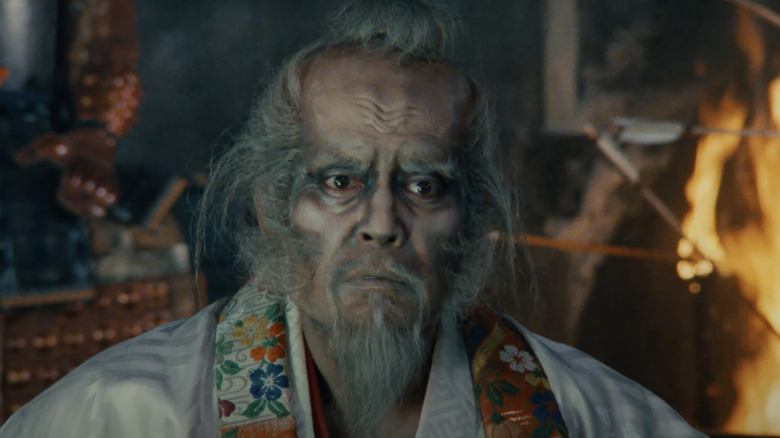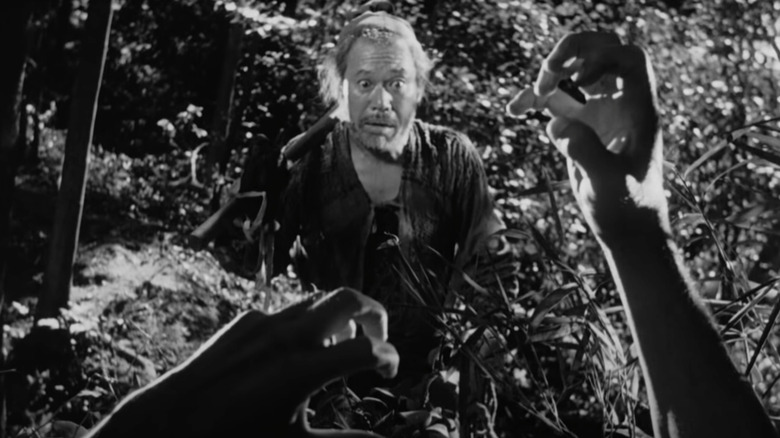Akira Kurosawa's Career Advice Every Aspiring Director Needs To Hear
Few directors are more beloved by filmmakers and cinephiles alike than Japanese auteur Akira Kurosawa. The man spent five decades creating some of cinema's most celebrated works, from the redefining action epic "Seven Samurai" to the sunbaked film noir "Stray Dog" to his take on William Shakespeare's "King Lear" with "Ran." If a film features a story from multiple viewpoints, it will inevitably be said to have a "Rashomon"-like structure, one of his films. Hell, you wouldn't have "Star Wars" if it wasn't for Kurosawa's film "The Hidden Fortress," and I know you people love that "Star Wars." Kurosawa, like Orson Welles and Stanley Kubrick, is basically a fundamental text of understanding how cinema has worked for the last 50+ years. Therefore, any advice Kurosawa has for people if they want to become directors themselves is probably wisdom a lot of people are eager to hear.
Learning from the greats is vital for succeeding as an artist yourself. Luckily in 1993, Kurosawa sat down with "In the Realm of the Senses" and "Merry Christmas, Mr. Lawrence" director Nagisa Ōshima for the television documentary "My Life in Cinema," which was a conversation between the two for the Directors Guild of Japan. The talk touches on all aspects of his career and process throughout the years, but I want to focus on what he has to say to aspiring filmmakers. One would assume from a filmmaker so adept at using the camera that something about framing, lighting, blocking, or working with actors would be where he focuses his advice. Turns out, his lesson concerns an entirely different discipline all together.
Put it on the page
Akira Kurosawa knows how incredibly difficult it is to make a film, but every film begins with the same thing: a screenplay. You need something on the page to inspire you to think visually. In one section of "My Life in Cinema," Kurosawa says:
"The thing I stress most to the aspiring directors who often come knocking at my door is this: 'It costs a great deal of money to make a film these days, and it's hard to become a director. You must learn and experience various things to become a director, and it's not so easily accomplished. But if you genuinely want to make films, then write screenplays. All you need to write a script is paper and pencil. It's only through writing scripts that you learn specifics about the structure of film and what cinema is.'"
It really is quite sage advice. Writing is an incredibly cheap way to express your artistic ideas, even if it is not the medium you want to be working in. No budget, no crew, no limitations. You can put anything your heart desires on a piece of paper, and once you've done that, you can begin to think about how to conceive your vision in a cinematic form. Of course, writing isn't easy and can be quite isolating. Staring at a blank page is either the most invigorating feeling or the most disheartening one. Kurosawa goes on to talk about whether the people he tells this advice to heed it:
"That's what I tell them, but they still won't write. They find writing too hard. And it is. Writing scripts is a hard job. Still, Balzac said that for writers, including novelists, the most essential and necessary thing is the forbearance to face the dull task of writing one word at a time."
I have written a few screenplays in my life (none of them good), and it truly is some of the most difficult artistic work you can imagine. However, it also opens your mind about the flow of scene, character motivation, pacing, detail, and language. Being a writer has you perform every task that occurs on a film set in your mind, whether you are choosing a couch for a living room or acting as the lead character. It gives you the full scope of the story you want to tell. Before the era in which Kurosawa rose to prominence, directors almost never wrote the films they worked on. Now, finding a beloved filmmaker who is not involved in the scripting process is a rarity. All but one of the nominated screenplays this year at the Academy Awards were written or co-written by the films' directors. Writing is an essential element in crafting cinematic stories, and whether you find it scary or not, looking at that blank page is going to help you in ways you never even could have imagined. Don't take my word for it. Listen to Kurosawa. He knows what he is talking about.

